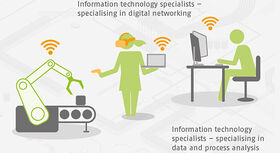Profile of an occupation – information technology specialist
Information technology specialists work in all areas of computer science and information technology. Their field of deployment is very wide-ranging. In order to take account of the technological shift and of new areas of activity such as big data, robotics, Industry 4.0, cyber physical systems and IT in products, the training occupation was modernised in 2020 and expanded from two to a total of four specialisms. The description covers the tasks of IT specialists and the technological trends characterising the occupation.

Working in the field of new technologies

Information technology specialists work in the IT sector. They also find employment at companies across virtually all areas of trade and industry, in organisations and in the public sector. Their fields of work range from the administration of computer networks to application development. Joint training contents for information technology specialists in all specialisms provide qualified IT workers with the fundamental tools of their trade. Specialisation takes place in each respective discipline.
Practically no other field has seen as many innovations as information technology over recent years. In order to take account of this progress, the training occupation of information technology specialist was modernised alongside three further dual IT training occupations in 2020. As part of this, the existing specialisations of system integration and applications development were supplemented via the addition of the new specialisms data and process analysis and digital networking. Both of these symbolically represent the IT occupations’ update.
Information technology specialists specialising in applications development develop software solutions. Tasks in the specialism of systems integration are the design, installation and administration of networked IT systems.
Information technology specialists in the new specialism of digital networking work at the interfaces between network components and cyber-physical systems and are “Industry 4.0ers”. They are involved in industrial production, network industrial manufacturing plants and facilitate or monitor data transfer between machines. Large amounts of data are generated, and these then need to be analysed in order to improve production processes. This forms the occupational field of activity of information technology specialists in the new specialism of data and process analysis. At the company, they ensure that data is available in the required scope and quality. They are also active within the environment of new technologies, such as machine-based learning. This is an important basis for various AI applications. Information technology specialists in the two new specialisms work together closely at the company (cf. Figure 1).
Focus on IT security
IT security and data protection constitute an extensive element of training. The continuous networking via the Internet of Things, online retail, big data and cloud computing poses many security risks for companies. Data theft via phishing attacks, forged electronic cards, hacker break-ins and cyber terrorism requires constant adaptation of security measures. This makes IT security a growth market, and the demand for experts is therefore strong.
Special term – cyber-physical systems
In cyber-physical systems (CPS), mechanical components are linked with one another via networks and modern information technology. CPS are frequently deployed in connection with application areas in Industry 4.0, for example in industrial production and in environmental, medical and transport technology.
Employment opportunities and career

IT is deployed in almost all areas, and skilled workers are in high demand. The number of vacancies for IT specialists is at a high level across sectors (cf. Figure 2). For this reason, many companies are searching for young people interested in entering IT training. After they have completed initial VET, numerous career pathways and opportunities for further professional development are open to qualified IT workers. All IT occupations enjoy access to the nationally standardised IT continuing training system. There are also other uniform qualifications governed by federal law (including master craftsperson communication technicians, also known as Bachelor Professional in Information Technology) and qualifications at chamber level (such as certified information technologist). The growing number of higher education programmes which recognise qualifications acquired by vocational means is further enhancing the attractiveness of initial and continuing VET in information technology (e.g. Open IT – offene-hochschule.org).
At a glance
- Last updated: 2020
- Duration of training: 3 years
- Responsibility: trade and industry
- Training structure: Training occupation with four specialisms
- Systems integration
- Applications development
- Data and process analysis
- Digital networking
- 4–5 additional areas of deployment per specialism
- DQR reference level: 4
-
Advanced training: includes the IT continuing training system (IT-WBS)
BIBB website page on the occupation (in German)
Occupational information in the sector (in German)
Structuring Training series of publications: Information technology specialist (in German)
Figure 1 to download
Podcast on the profile of occupation featuring two trainees (in German)
Sources: https://it-berufe.de/, Federal Employment Agency (berufenet)
(All links: status 13/3/2023)
(Compiled by Arne Schambeck)
Translation from the German original (published in BWP 1/2023): Martin Kelsey, GlobalSprachTeam, Berlin